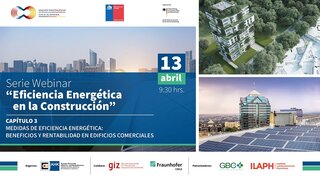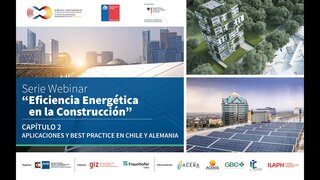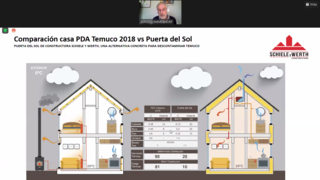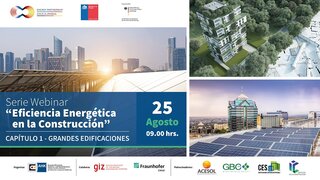Webinar Series "Energy Efficiency in Buildings"
Within cities, buildings are amongst the largest contributors to CO2 emissions, being responsible for approximately 40% of global emissions of this pollutant. The role of large buildings in the emission of carbon dioxide, the main gas implicated in global warming, is extremely high, and shows clearly that one of the fundamental keys to the solution to this pressing problem lies in the improvement of the architecture and energy performance of buildings, aiming to higher efficiency and making them more environmentally friendly.
There’s a widespread consensus that climate protection is only possible through a significative reduction of energy consumption and green-house gases’ emission in the building sector. At the same time, there are intense discussions about which instruments are adequate to reach the Paris Agreement’s goals.
Chile's first Energy Efficiency Law was enacted in 2021. It seeks to promote the responsible and efficient use of energy resources to help improve productivity and economic competitiveness, as well as to improve people's quality of life and reduce pollutant emissions. The law aims to promote energy management in large consumers such as mining, cement and forestry companies, but also covers other industries such as real estate, setting clear targets that would allow a 10% reduction in energy intensity by 2030.
Due to these reasons, AHK Chile, together with GIZ (Deutsche Gesellschaft für Internationale Zusammenarbeit) and Fraunhofer Society, have organized a series of webinars about “Energy Efficiency in Buildings”, in the framework of the Energy Partnership Chile-Alemania, which started on April 9th, 2019, following the signature of a declaration of intent between the German Federal Ministry of Economic Affairs and Climate Action (BMWK) and the Chilean Ministry of Energy. The Energy Partnership has a full-time secretariat in Santiago de Chile. GIZ is the implementing organisation of this partnership. Together with the Chilean Ministry of Energy, they have been successfully cooperating for more than 10 years. For its part, AHK Chile contributes the synergies of trade cooperation to the Energy Partnership.
Third webinar: "Energy Efficiency Measures: Benefits and returns in commercial buildings"
The series of webinars closed with participants from Chile, the United States, Spain, Colombia, Argentina and Brazil.
How can measures to combat climate change generate positive externalities, increased productivity and competitiveness? The benefits and cost-effectiveness of energy efficiency measures in commercial buildings were the focus of the third and last chapter of the webinar series "Energy Efficiency in Construction" organised by AHK Chile in cooperation with GIZ Chile and Fraunhofer Society in the framework of the Energypartnership Chile-Alemania. In the previous chapters, the possibilities of constructing large, energy-efficient buildings had been discussed in depth and applications and best practices in Chile and Germany had been presented.
The audience from five countries was able to learn about the benefits of an energy-efficient building, how to invest in energy efficiency today in order to save energy in the medium and long term, and to familiarise themselves with existing support programmes: this is what the audience from five countries was able to take away in April.
"On a global scale, every week, new buildings, houses etc. are constructed on an area roughly the size of Paris. The built-up area is expected to double by 2060, which will have a huge impact on the climate. The operation and construction of buildings produces 38% of all energy-related CO2 emissions, according to UNEP".
Daina Neddemeyer, Project Leader of the Energy Partnership
Today, sustainability is a good business and this is demonstrated by initiatives and benefits that this circle of virtue brings", explained Juan Pablo Payero, Head of Industry and Mining Development Line at the Energy Sustainability Agency. In his opening presentation, he mentioned different promotion programmes currently available, from free consultancy and financing alternatives for SMEs to specialised loans (see video).
For example, a cooperation agreement signed by the Ministry of Energy, BancoEstado and the Energy Sustainability Agency is developing different actions aimed at reducing information barriers and facilitating financing for energy efficiency and non-conventional renewable energy projects in companies and homes. All this with the goal of introducing improvements and efficiency in the use and generation of energy to obtain savings that at the same time contribute to protecting the environment.
As a result, the first specialised credit is available for financing self-consumption projects using Non-Conventional Renewable Energies (NCRE) and Energy Efficiency (EE) for smaller companies with an annual turnover of between UF 2,400 and UF 40,000, and for individuals wishing to improve their homes. This and other financing alternatives (credits, subsidies and the ESCO model) are disclosed on the website of the Sustainability Agency.
The Corporate Development Manager of the construction company Sencorp, Alfonso Barroilhet Costabal, discussed the relationship between return and investment in the case of energy-efficient buildings. Sencorp is a group with more than 60 years of experience in the development of cutting-edge real estate solutions, whose projects have a positive impact on people's lives and the quality of life in cities.
The last speaker was Gerardo Fernández, Head of Country Real Estate (Argentina, Chile, Uruguay) of Siemens, who commented on the advantages and profitability of offices in an energy efficient building from the perspective of the client and user. Siemens is the first private company in Chile to obtain the Certificate of Excellence from the Ministry of Environment's Green Office programme, and voluntarily joined a series of audits to measure its purchasing system, internal environmental education, transport, HuellaChile, electricity, waste, water and paper use, among other indicators.
Video: Capítulo 3 - Webinar de Eficiencia Energética en la Contrucción.

Second Webinar: "Applications and Good Practices in Chile and Germany"
"In order for our cities to be sustainable, it will be important to consider the carbon footprint of the entire construction cycle".
On October 27, the second episode of the webinar series, with the topic "Applications and Best Practices in Chile and Germany", was held. On this webinar, representatives from the Chilean Ministry of Housing and Urban Development (MINVU), Fraunhoffer ISE, the Latin-American Passivhaus Institute, and the Karlsruher Institut für Technologie spoke about energy efficiency promotion programmes in Chile, façade-integrated photovoltaic systems, and concrete examples of passive cooling and heating in structures.
The topic has been gaining much relevance in Chile in recent years, which is reflected, among others, in the enactment of the first Energy Efficiency Law at the beginning of 2021. This seeks to promote the rational and efficient use of energy resources to help improve productivity and economic competitiveness, as well as to improve people's quality of life and reduce pollutant emissions. The regulation aims to promote energy management in large consumers such as mining, cement and forestry companies, but also covers other industries such as real estate, setting clear targets that would allow a 10% reduction in energy intensity by 2030.
Daina Neddemeyer, head of the Energy Partnership Chile-Germany project at GIZ Chile (Deutsche Gesellschaft für Internationale Zusammenarbeit), the implementing organisation of this alliance, opened the round of presentations by stating that "for our cities to be sustainable, it will be important to consider the carbon footprint of the entire construction cycle".
In the same direction, the Chilean Ministry of Energy has been promoting different programmes to promote the use of renewable energies, for example, through the installation of photovoltaic panels connected to the grid. In the webinar, the Chilean Ministry of Housing and Urban Planning (MINVU), delved into different public programmes to promote energy efficiency measures in construction. "One of the lesser known roles of the housing ministry is the regulation of the building sector. Under this logic, we have decided to cross the roles of promoter of public housing policies and regulator, to advance in favour of energy efficiency", explained Marcelo Soto, Head of the Department of Construction Technologies of MINVU.
In addition, the event presented photovoltaic systems integrated into facades on which the Fraunhofer ISE Institute is working, examples of good practices in Chile of the Passivhaus building standard and a pilot project between the Karlsruher Institut für Technologie (KIT) and the University of Concepción in the south of Chile. Renzo Vallebuona, Architect for Building Design at the KIT, presented the IceLab III project: "We have designed a fully airtight structure based on aluminium and wood. This prototype was designed for the Patagonia region in southern Chile and will be tested in Caleta Tortel. For insulation, we decided to compare all the local insulating materials we knew, from the most to the least ecological, and we decided on sheep's wool as insulation."
It is worth noting that only 4 countries, including Chile, were declared by the Climate Action Tracker (CAT) as robust, with concrete actions and plans for 2030 to achieve carbon neutrality, being recognised as "climate champions" in the framework of the COP26. Being a relevant actor on the scene, more than 330 people connected from Germany, Argentina, Brazil, Chile, Colombia, Spain, USA, Mexico, Peru and Switzerland, followed the webinar with interest. How is energy efficiency in the area of interior lighting of buildings reflected in construction? Are there currently any measures that focus on energy efficiency during the construction of a project? When will the new thermal regulations come into force? When does the amount of energy needed to produce insulation material pay off in proportion to the energy savings in the house? These were just some of the questions that the public put to the experts during the dynamic question rounds.
Video: Capítulo 2 - Webinar de Eficiencia Energética en la Contrucción.

First webinar: "Large Buildings"
Under this title, the first episode of this series took place on August 25th, seeking to delve in the possibilities for constructing more energy-efficient large buildings and to identify where and how to invest to achieve short-term benefits and savings.
Nicolás Pintor, Head of the Infrastructure, Building and Cities Unit of the Chilean Ministry of Energy, contextualized the importance of the new Energy Efficiency Law, under which the energy rating of new buildings will be mandatory. Arnulf Dinkel, Project Manager of the Department for Energy Efficiency in Buildings at Fraunhofer ISE, explained the organisation’s work and the current developments around this topic in Germany, where the Law of Energy Efficiency in Buildings demands energy certification for all new buildings. He also highlighted the importance that building re-conditioning has, going into further details about how this could be achieved.
Hernán Madrid, Head of Sustainable Building’s Certification at the Construction Institute, stated that 424 buildings are currently undergoing this process. He concluded his presentation with the bi-provincial Hospital Quillota Petorca, which was awarded an Outstanding Certification.
Finally, George Sommerhoff, General Manager of EEChile at the Passivhaus Institute, presented this certification developed in Germany, which aims at energy efficiency, the elimination of CO2 emissions, and the comfort of the inhabitants. To acquire this certification, it’s required to not exceed 15 kWh/m2 in heating and cooling, not exceed 25°C in summer, and to be airtight. Applying these criteria to houses in Temuco, a city with air pollution issues, it was observed that the certification could reduce their energy demands by 90%, compared to current consumption.

Video: Capítulo 1 - Webinar de Eficiencia Energética en la Contrucción.
